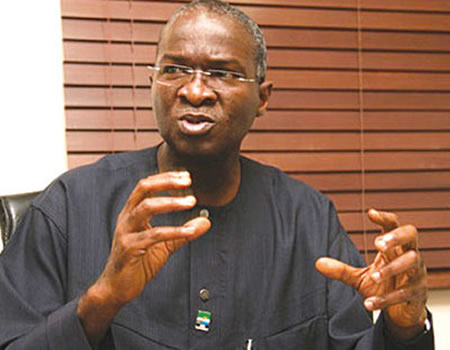The Minister of Power, Works and Housing, Babatunde Fashola, has said the Federal Government would create long term employment and alsoreduce the poverty rate in the country through the maintance of its public infrastructural assets.
Speaking at the quarterly lecture series organised by the National Institute for Cultural Orientation (NICO), in Abuja, Fashola, who was represented by the Deputy Director, Rehabilitation in the ministry, Augustine Ocheje, said that a process was also ongoing to amend procurement laws.
He said the current administration was redeveloping and maintaining road networks in the six geopolitical zones in the country.
Adelabu heads to tribunal over Makinde’s victory in Oyo
He noted that the government was also involved in the maintenance of all bridges on federal roads, rebuilding road networks in Federal Universities and also building power stations in Federal Universities.
The minister added that the major focus of the current administration was the development of infrastructures in pursuit of the key objectives of the Economic Recovery and Growth Plan (ERGP).
Fashola said, “a major focus of the current administration happens to be the development of infrastructures in pursuit of one of the key objectives of its Economic Recovery and Growth Plan (ERGP). Accordingly, government has invested heavily on road infrastructures, airports, water resources, power, public buildings and housing among others”.
He emphasised that there was a direct link between infrastructure development, poverty reduction and employment creation.
He added that the maintenance of public assets would create sustainable long-term employment and poverty reduction while the life span and functionality of public assets would be elongated and improved.
Acting Executive Secretary of NICO, Mr Louis Eriomala, said the lecture with the theme: “Maintenance culture: a panacea for sustainable infrastructural development in Nigeria”, was chosen considering the poor state of our nation’s infrastructural architecture.
He said, “maintenance culture has proven to be a major contributor to sustainable development in developed nations where buildings, roads built decades ago still function optimally.
“This is not the case with developing nations where infrastructures are left to the point of total decay and dilapidation before repairs are embarked upon.
“In order to promote maintenance culture in Nigeria, we suggest Nigerians need a positive attitude towards the nation’s infrastructure by owning them, ensuring their protection and maintenance.
“While maintenance should be carried out at the appropriate time, adequate funds must be provided for agencies or units responsible for maintenance of our infrastructure,” he said.






